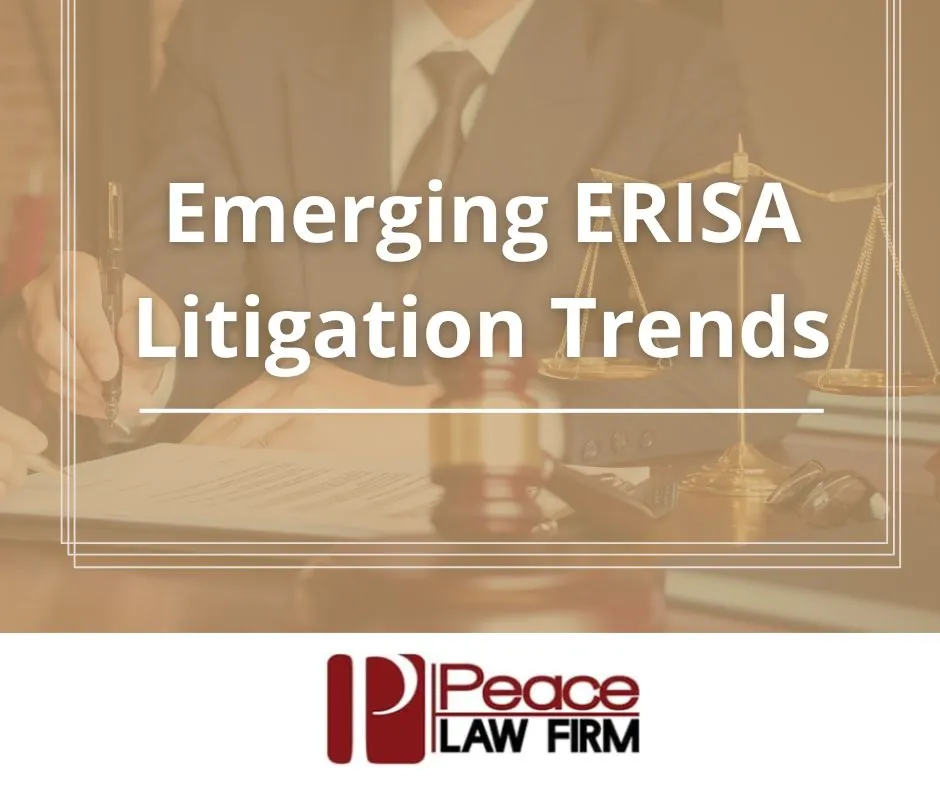Emerging ERISA Litigation Trends

The Employee Retirement Income Security Act (ERISA) is a crucial, sweeping law. As such, courts are constantly resolving new ERISA issues. Plaintiffs bring new arguments, try novel theories, and focus on different parts of the plan. Meanwhile, different circuit courts respond to those new theories in distinct ways. All of these factors combine to create a shifting landscape around ERISA that you need to understand.
In this article, we’ll discuss the latest ERISA litigation trends. Specific topics include the most common litigation issues, notable recent court cases, and updates to ERISA regulations. If you have more questions or need specific legal advice, then give the Peace Law Firm a call today.
Recent ERISA Litigation Trends
Several key issues have recently emerged in the legal landscape surrounding ERISA. Let’s dissect these in more detail.
Excessive Fee Litigation
Recently, there has been an uptick in the number of cases surrounding excessive fees. By way of background, ERISA requires insurance plan fiduciaries to charge reasonable fees. Fiduciaries must also maintain appropriate documentation and act prudently.
Excessive fee lawsuits allege that fiduciaries are charging plan participants gratuitous fees. These kinds of lawsuits are usually class-action cases, meaning that many different plaintiffs come together to sue the defendant collectively.
One particularly notable example of these excessive fees cases is Smith v. CommonSpirit Health, a Sixth Circuit Court of Appeals case. In this decision, the Sixth Circuit stated that a plaintiff alleging excessive fees must give a plausible comparison to demonstrate that the fees were imprudently high.
Other courts have since followed this approach. Together, this plausibility standard could potentially limit the success of broad or vague allegations of excessive fees.
Pleading Standards for Fiduciary Breach Claims
In Hughes v. Northwestern Univ., 142 S. Ct. 737, 742 (2022), the Supreme Court emphasized that plaintiffs bringing ERISA claims must meet the pleading requirements established in two earlier Supreme Court cases, Bell Atlantic Corp. v. Twombly, 550 U.S. 544 (2007), and Ashcroft v. Iqbal, 556 U.S. 662 (2009).
The Court clarified that in evaluating a motion to dismiss in a fiduciary breach lawsuit, a district court must perform a “context-specific inquiry.” This inquiry is used to determine if the plaintiff has credibly claimed that the plan fiduciaries failed to act prudently.
The Court also reiterated the need to defer to the judgment of plan fiduciaries because of the complex choices fiduciaries have to make.
Unfortunately, the Court’s holding in Hughes was fairly narrow. They did not address another key question: Is it sufficient to allege a fiduciary breach by merely pointing out a disparity in the performance of different investment strategies? Various circuit courts have come to different conclusions on the issue, and it continues to be hotly litigated.
Fiduciary Obligations
Similarly, the consequences of the Supreme Court’s decision in Tibble v. Edison International continue to resonate throughout the various circuit courts. Tibble’s primary impact pertains to how courts should understand a fiduciary’s duty to monitor investments under ERISA.
The Supreme Court articulated that a fiduciary is not only responsible for the selection of investments but also for the ongoing monitoring of those investments. In other words, the fiduciary should continually review whether the investments that they previously selected continue to be good choices for plan participants. This conclusion may seem simple enough, but it has opened the floodgates for a host of new claims against plan fiduciaries.
Prohibited Transaction Claims
Several splits between circuit courts emerged in 2023 over the issue of prohibited transaction claims. Specifically, the courts cannot agree on the type of allegations necessary to sustain a prohibited transaction claim under ERISA.
The Second Circuit Court held in Cunningham v. Cornell University that plaintiffs must plausibly allege two things—that a prohibited transaction occurred and that no ERISA exemption applies. This holding diverges significantly from other jurisdictions like the Eighth Circuit, which treats ERISA exemptions more like an affirmative defense rather than something a party must plead at the opening of the case.
Curious How These ERISA Litigation Trends Affect You? Reach Out to Us Today
ERISA is an infamously complex law. However, it’s a law you simply cannot afford to ignore because of its sweeping protections for American workers. The consequences of these litigations have far-reaching implications for every ERISA plaintiff.
Consequently, you should contact an SC ERISA attorney if you think you have a potential ERISA claim. Furthermore, you should find an ERISA attorney with ample experience and an excellent track record.
The Peace Law Firm is one of the nation’s top ERISA firms. John Peace founded the firm in 2002 to give a voice to individuals mistreated by their employers or other large organizations. Over more than 20 years, he has recovered millions for his clients.
Thanks to his ample experience, he can give you outstanding legal advice on every kind of ERISA issue. In addition, he is passionate about giving you sterling customer service. Set up a free consultation today by calling us or reaching out online. Let us be your guide and advocate.
